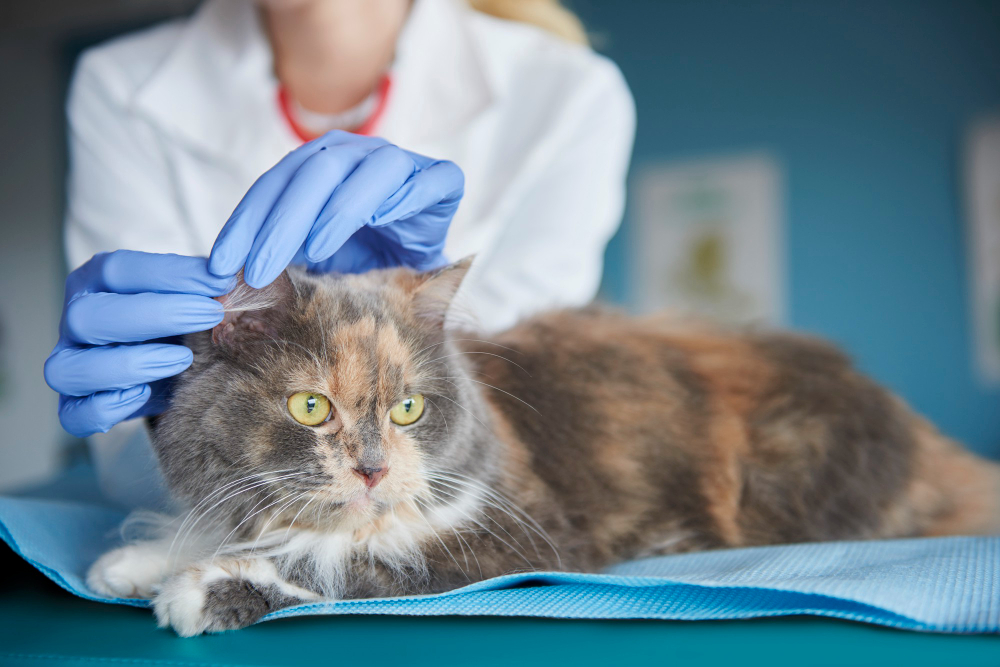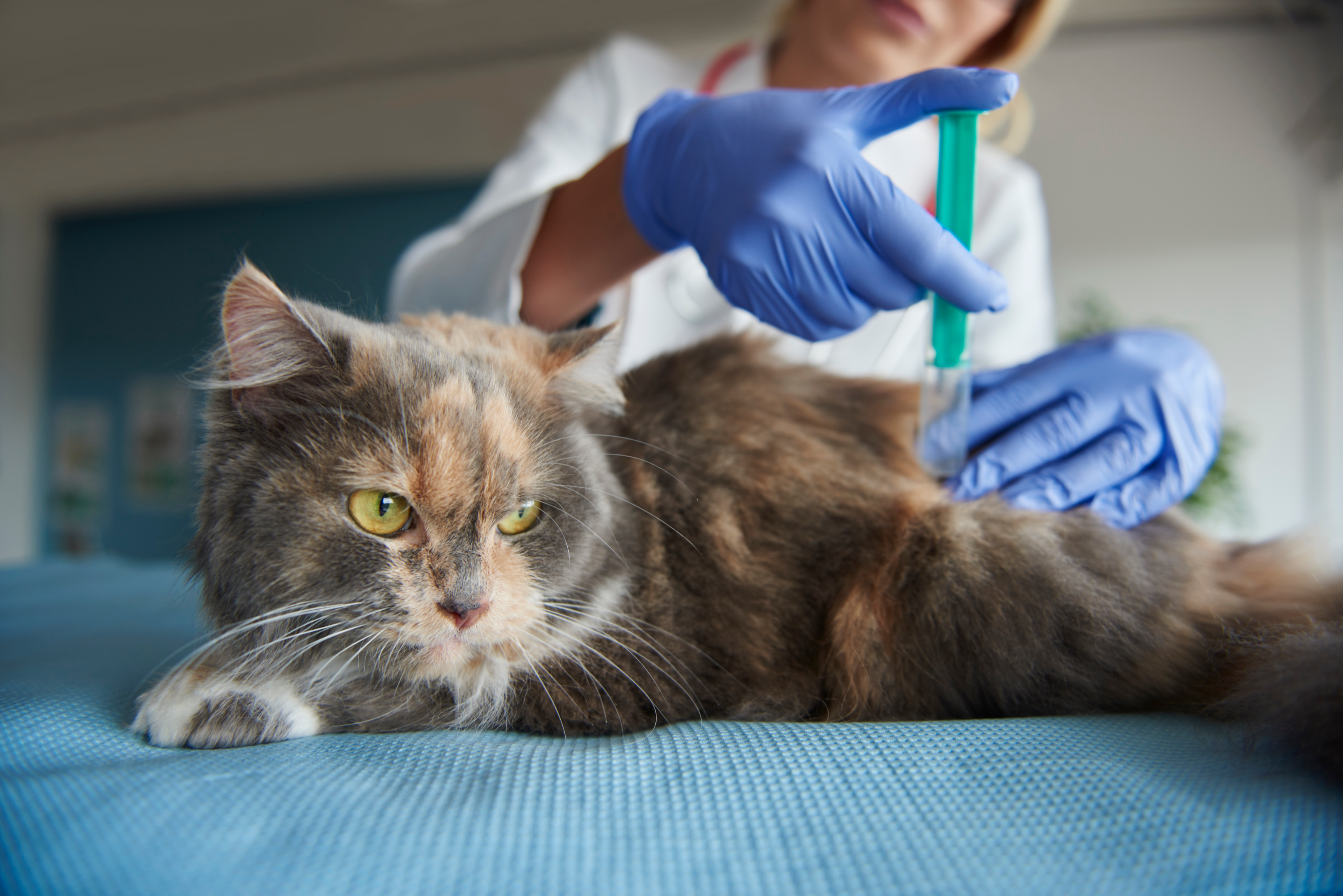Isn't it just the best feeling in the world when your cat comes purring to you looking for some love? These furry little beings make everything better. However, it is not always sunshine and rainbows when it comes to keeping cats as pets.
Cats are known for their keen senses, especially their acute hearing. But what happens when your cat's ears get ear mites? Ear mites in cats can cause discomfort and potentially damage your cat's ear canal. Ear mites feed on skin debris, cell fluids, and blood. They even chew the tissue of the cat's ear canal.
If an ear mite infestation is left untreated it might also spread to humans. Even more annoying is that these ear mites just love to stick around on your furniture and bedding. Plus, even if you don't have your own cat, hanging out with an infected one can still be a problem for you.
In this article, we will discuss the symptoms of ear mites in cats, how to detect them, and effective methods for treatment and prevention.
Symptoms of Ear Mites in Cats

It is important to first discuss what ear mite infestations look like before diving into natural remedies to treat ear mites.
So, let's talk about how to spot those sneaky ear mites in your cat. Early detection is key to making your feline friend feel better by treating ear mites properly and adequately.
Here are common symptoms to watch out for:
- Ear Scratching: If your cat seems to be scratching their ears very frequently then that's an issue. They might even use their paws or rub their ears against things to get relief. Itchy ears are the first sign of ear mites in cats.
- Head Shaking: Head shaking like it's a competition is not normal for cats. It is another telltale sign they might be dealing with ear mites.
- Ear Discharge: Cats ear mites can cause a dark and crumbly discharge that resembles coffee grounds. It can also make their ears a bit stinky and dirty.
- Redness and Inflammation: Inflammation is very common when there are ear mites inside a cat's ear. The reason for this is that the ear mites are causing irritation to your cat's ear canal.
- Scabs and Sores: Frequent scratching and irritation causes scabs and sores around the ears.
- Hair Loss: In more severe cases, your feline friend might lose fur around their ears, especially if they're a long-haired breed.
- Balance Issues: You should treat your cat's ear mites as soon as possible because if the ear mites infestation becomes serious your cat might start wobbling around a bit or even have a head tilt.
How to Check for Ear Mites in Cats

Before you start looking into home remedies, first ensure that your cat indeed has ear mites. Early detection is important to properly treat ear mites in cats.
Here are some easy ways to check for ear mites in cats:
- Look for physical evidence: Gently hold your cat's ear flap and take a peek inside with a flashlight. If you find any dark and crumbly debris inside the ear canal then it is a clear indication of ear mites.
- Massage the back of your cat's ears: More often than not the mite debris is located deep inside the cat's ear canals which is not visible to the naked eye. So, massage the back of your cat's ears. If there are mites then your cat will start scratching their ear.
- Look out for symptoms: Notice if your cat is constantly scratching their ears since usually it is the first sign of a potential infestation.
- Consult a Vet: Before starting on any ear mite medications it is important to consult your vet immediately. There can be other reasons for itchy ears and debris in the ear canal. Therefore, it is important to confirm it first. The vet can do a proper check and confirm whether it's indeed cat ear mites or something else.
How to Get Rid of Ear Mites in Cats

Once you get the confirmation from your vet that it is indeed ear mites then you can start looking for treatments.
Your vet will most likely prescribe ear drops. For the ear drops to work first a cleaning solution is put inside the cat's ears. This is to ensure all the ear mites are expelled from the ear. Next, gently massage your cat's ears to bring the debris to the outer ear. Then wipe the debris away with a tissue or cotton ball. Cotton swab is not recommended to be used since it can cause damage to the cat's ear drum. Repeat this process until all the debris is gone.
These over-the-counter medicines should be used with care since ear mite medicine such as Pyrethin is toxic to cats. So, if you are uncomfortable administering store-bought medicines to treat ear mites then you can also look into natural treatments.
Here are some natural home remedies to help your furry friend feel better:

Method 1: Olive oil
Olive oil is a great natural remedy to get rid of ear mites. It contains antibacterial properties and can reduce inflammation.
Here's how to use olive oil:
- Step 1: Warm the oil to a comfortable temperature by placing the container in warm water.
- Step 2: Gently tilt your cat's head to one side and put a few drops of the warm oil into their ear.
- Step 3: Massage the ears to help the oil go deeper.
- Step 4: Use a clean cotton ball to wipe away the ear mites and discharge.
- Follow this routine daily for a few days, or as your vet advises.
Method 2: Apple Cider Vinegar (ACV)
Apple cider vinegar is one of the best natural remedies to treat ear mites because of its antibacterial and antifungal properties. It also helps in lowering your cat's cholestrol and blood pressure.
Here's how to use it:
- Step 1: Mix half part apple cider vinegar and half part water in a clean container.
- Step 2: Soak a cotton ball in the solution.
- Step 3: Squeeze out the extra liquid and put the cotton ball in your cat's ear.
- Step 4: Massage your cat's ear to spread the solution around evenly.
- Step 5: Wipe off any discharge and debris with a clean cotton ball.
- Use this method once or twice daily until the ear mites are gone.
Method 3: Aloe Vera
Aloe vera is known for being soothing and healing. It can help your cat find some relief from the irritation. Here's what you do:
- Step 1: Buy aloe vera gel or juice. You can even use aloe vera plant to extract the gel.
- Step 2: Using a clean dropper, put a few drops of aloe vera right into your cat's ear.
- Step 3: Gently massage your cat's ear to help spread the aloe vera.
- Step 4: Use a clean cotton ball to wipe away any discharge and debris.
- Keep up with this routine daily for a week until the ear mites are gone.
Preventing Ear Mites in Cats

With early detection and the right kind of treatment ear mites in cats are an easy fix. However, they can be a real nuisance so it is better to take preventive measures than to constantly having to deal with them.
- Regular Ear Check-Ups: Regularly check your cat's ears for ear mites. The earlier you catch the problem the easier it is treat. Routine ear care will protect your cat's sensitive skin oils.
- Cleanliness and Grooming: Mites or not, cleaning and grooming should be a part of your cat's hygiene. Having their fur cleaned and their ears disinfected can go a long way in preventing ear mites.
- Keep away Infected Cats: Mites are contagious so they can spread from one cat to another. Therefore, if you know of any other animals with ear mites then keep your feline friend away from them.
- Remove fleas: Oftentimes, when cats get fleas ear mites come along with them. So, if your cat has fleas then make sure to clean it.
- Keep your cat inside: As much as it is possible engage your cat in indoor activities. Cats who wander outside are more prone to getting ear mites.
Untreated Ear Mites in Cats

Ear mites might not seem to be a big issue but can become one if left untreated. Ear mites feed on the cat's skin so they can do serious damage to your cat's ear and even go deep into the ear canal and damage it. Prolonged exposure to ear mites can also cause deafness in cats.
While ear mites love to infest ears they do spread to other parts of the body. If you have more than one pet then ear mites can also spread to other animals.
Moreover, the constant scratching can lead to open sores and then turn into bacterial infections.
Final Words
Now that you know all about ear mites and how to treat them using natural home remedies, you're better prepared to help your cat when they need it.
Remember, if you are unable to handle the ear mites then consult your vet immediately. They can provide guidance and make sure your kitty's ears get the care they need.
FAQ
Can ear mites cause deafness in cats?
Yes, in very serious cases the bacterial infection caused by ear mites can cause partial or total deafness in cats.
What medicine kills ear mites?
Medicines containing pyrethrins are the most effective in killing ear mites. However, pyrethrin is toxic to cats so you have to be extremely cautious if you want to use it. Most vets now prescribe over-the-counter medications containing ivermectin which kills the ear mites but is not deadly for cats.
Do you have to take your cat to the vet for ear mites?
You should consult your vet as soon as possible because if your natural remedies for ear mites are not working then the infestation can cause bacterial infection leading to more severe issues.
How do you get rid of ear mites in cats?
There are many ways to get rid of ear mites in cats. The simplest one is to clean the ear with a cotton ball and get rid of as much debris as possible. Then, add ear drops into the cat's ear and massage it. Put ivermectin or any other medicine prescribed by your vet into ears. Repeat the process until the mites are gone.
How do you know if your cat has ear mites?
Usually frequent head shaking and scratching are telltale signs of an infestation. On further inspection you might find dark crumbly debris inside the ear.



0 comments